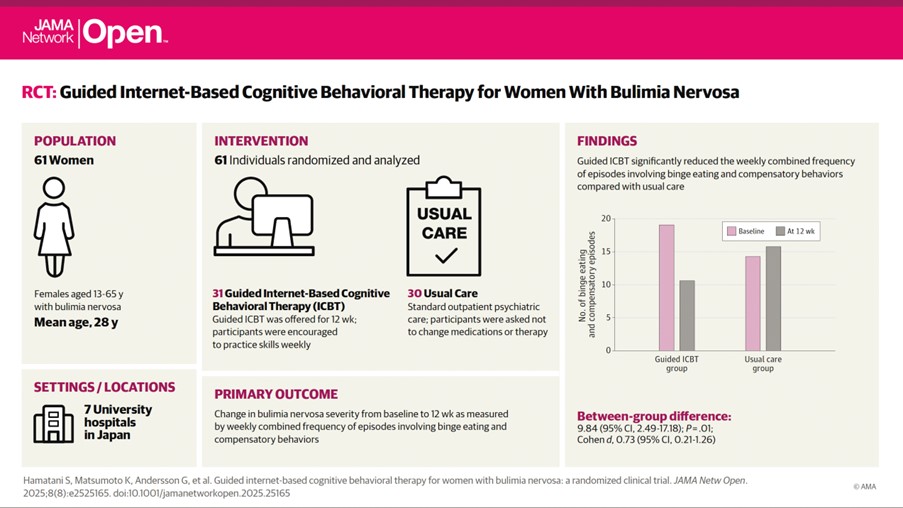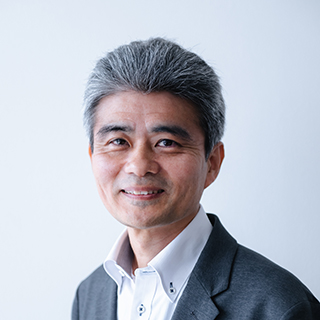A 12-week internet-based program helped women suffering from bulimia reduce binge eating and compensatory behaviors
Bulimia nervosa is an eating disorder that often goes untreated owing to limited access to specialist care. To address this, researchers tested a guided internet-based cognitive behavioral therapy program for women with bulimia that could be delivered online. They found that online therapy reduced binge eating and purge behaviors and achieved improved remission rates compared to usual care, offering a promising way to make effective treatment more accessible for people with limited clinic access.
Bulimia nervosa (BN), or bulimia, is a mental health disorder characterized by binge eating and a fear of gaining weight, which drives people to try and avoid weight gain, usually by compensatory (vomiting, etc.). Over time, this binge–purge cycle harms both physical and mental health of the individual, leading to problems like dehydration, low blood pressure, depression, and even self-harm. BN mostly affects young women and often begins in their teenage years, with studies showing that up to three percent of women may experience BN at some point in their lives, putting them at higher risk if left untreated.
BN is thought to develop from harmful learned habits that can be changed with cognitive behavioral therapy (CBT). This approach helps people break the binge–purge cycle by challenging negative thoughts and beliefs related to dieting and body weight. However, for many people, especially those living far away from specialist clinics, accessing face-to-face therapy is not always easy or even possible.
Now, in the first study of its kind conducted in Asia, an international team of researchers has shown that CBT can also be effective when delivered online. Their findings suggest that guided internet-based CBT (ICBT) can help people who otherwise struggle to get specialist care.
The study was conducted by Dr. Sayo Hamatani from the Research Center for Child Mental Development, University of Fukui, Japan, and included several co-authors, such as Dr. Kazuki Matsumoto from Kagoshima University, Japan; Dr. Gerhard Andersson from Linköping University in Sweden; and Dr. Yoshifumi Mizuno from University of Fukui, along with researchers from Tohoku University Hospital, Chiba University, Dokkyo Medical University Saitama Medical Center, National Center of Neurology and Psychiatry, and Tokushima University. The results were published online in Volume 8 of the journal JAMA Network Open on August 05, 2025.
“We undertook this study to lower barriers to accessing specialist care and help create a society where people can receive high-quality treatment regardless of where they live. By establishing a specialist online therapy that can be delivered at home, even patients in remote areas or with busy schedules will find it easier to continue treatment, supporting early intervention and preventing progression to more severe forms,” explains Dr. Hamatani as she speaks of the motivation behind the study.
The researchers assessed the efficacy of guided ICBT by comparing it to that of usual care. To this end, they recruited 61 women between the ages of 13 and 65 years (average age: 28 years), who were randomly assigned either to an intervention group that received guided ICBT or to a control group that continued with usual care. The program lasted 12 weeks, during which participants in the ICBT group worked through weekly online modules adapted for Japanese patients and received support from a therapist through an online platform. The program included strategies to help people resist urges to binge and purge, such as exercises to face triggers in a safe way and activities to help reshape negative views about their own bodies.
When the researchers compared the results at baseline and 12 weeks post-intervention, they found that women in the ICBT group showed significantly reduced binge eating and compensatory behaviors compared to those in the usual care group, with an average decrease of about 10 episodes in total. The percentage of women whose symptoms improved enough to be considered in remission, rose from just 13% with usual care to up to 55% with ICBT. Participants also reported feeling more satisfied with the online program, with more than 75% stating they would return to this treatment program if they needed help again.
These findings strongly make the case for continued support as essential for treating BN and preventing the condition from becoming more severe. Making CBT available online could very well be a game-changer for people who cannot easily access a clinic. “With insurance support and integration into healthcare systems, this approach could reach many more people and play a key role in treating BN,” highlights Dr. Hamatani.
Developing a system based on this study could potentially lead to high-quality care, promoting equitable mental healthcare and improving the overall quality-of-life among patients with BN.

Image title: Guided internet-based cognitive behavioral therapy (ICBT) shows promise for treating bulimia nervosa
Image caption: In a recent study, researchers from Japan devised a 12-week online CBT program with therapist guidance and weekly self-help modules that helped women achieve fewer binge eating episodes and higher remission rates than those who received usual care alone.
Image credit: Dr. Hamatani from University of Fukui, Japan
Image source link: https://doi.org/10.1001/jamanetworkopen.2025.25165
License type: CC-BY
Usage restrictions: Credit must be given to the creator.
Reference
Title of original paper: Guided Internet-Based Cognitive Behavioral Therapy for Women with Bulimia Nervosa: A Randomized Clinical Trial
Journal: JAMA Network Open
DOI: 10.1001/jamanetworkopen.2025.25165
Conflicts of interest (COI) statement: Dr Hamatani reported receiving grants from the Japan Society for the Promotion of Science and the Lotte Foundation during the conduct of the study. Dr Fukudo reported receiving personal fees from Viatris, Miyarisan, EA Pharma, and Astellas as well as grants from Tsumura, Biofermin, and Zespri outside the submitted work. Dr Mizuno reported receiving grants from the Japan Society for the Promotion of Science during the conduct of the study. No other disclosures were reported.
About University of Fukui, Japan
University of Fukui is a preeminent research institution with robust undergraduate and graduate schools focusing on education, medical and science, engineering, and global and community studies. The university conducts cutting-edge research and strives to nurture human resources capable of contributing to society on the local, national, and global level.
Website: https://www.u-fukui.ac.jp/eng/
About Assistant Professor Sayo Hamatani from University of Fukui, Japan
Sayo Hamatani, PhD, is an Assistant Professor specializing in internet-based cognitive-behavioral therapy. She earned her PhD in Medicine in 2017. As a recipient of the JSPS Research Fellowships for Young Scientists, she developed a culturally adapted ICBT program at Linköping University, Sweden. Her research focuses on eating disorders and ADHD, and the use of telemedicine to develop treatments through both domestic and international collaborations.
Funding information
This work was supported by Grants-in-Aid for Scientific Research from the Japan Society for the Promotion of Science (Grant JP22H00985), a Lotte Research Promotion Grant.
Media contact:
Yuuka Kawamoto
University of Fukui PR center
sskoho-k@ad.u-fukui.ac.jp
Tohoku University Hospital
Public Relations Office
press.med@grp.tohoku.ac.jp
Chiba University
Public Relations
koho-press@chiba-u.jp
Dokkyo Medical University
Planning and Public Relations Department
kikaku@dokkyomed.ac.jp
National Center of Neurology and Psychiatry
Public Relations Section
kouhou@ncnp.go.jp
Recommend
-

The joy of revealing the unknown: The challenge of solving the mystery of the Sun
2022.09.28
-

Unveiling the Truth of the Universe through Simulated Catalogs: Unleashing the Power of a Theoretical Telescope, ‘Supercomputer’
2023.08.07
-

Taking up Immunological Research against Incurable Diseases−The Significance of “1” Life
2023.01.12







